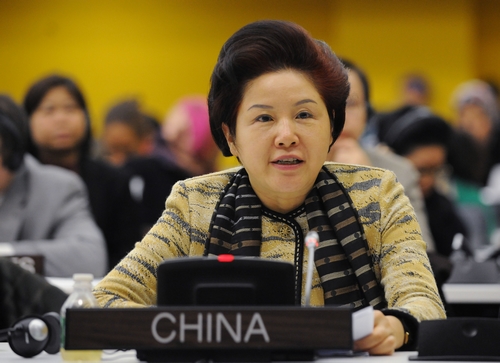| Statement by H. E. Ms. MENG Xiaosi, Head of the Chinese Delegation to 56th Session of the Commission on the Status of Women, Vice-Chairperson of the National Working Committee on Women and Children under the State Council of China | |
| 2012-02-28 05:45 | |
Madam Chair, Dear Friends, The Chinese delegation associates itself with the statement made by Algeria on behalf of G77 and China and wishes this session success. Over the years, the international community has worked actively to implement the Beijing Declaration and Platform for Action and achieved encouraging results. However, arduous tasks and challenges still remain. In order to promote women’s development and gender equality, the Chinese government has consistently promoted gender equality as a basic national policy. The final review of the Program for the Development of Chinese Women (2001-2010) showed that 23 out of 24 major targets in the program have been realized on schedule. In poverty eradiation, for instance, in 592 counties where poverty eradication has been set as a priority, poverty rate among women dropped from 24.2% in 2002 to 12% in 2009. In education, we have largely eliminated the gender difference in primary and middle school enrollment and further narrowed the gap in high schools and universities. In health care, the rate of in-hospital delivery increased to 97.8% in 2010 from 72.9% in 2000. In-hospital delivery for rural women reached 96.7%, a 48.3% increase over 2000. The Chinese government has also developed and issued a new program on women’s development in China for the next decade, which contains 57 major targets and 88 policy measures in 7 areas (namely health, education, economy, political participation, social security, environment and law). This program is aimed at responding to emerging situations and problems concerning women’s survival and development, with a special focus on women’s development in extremely poor and minority regions. Madam Chair, The Chinese delegation appreciates that the Commission has identified “rural women” as the priority theme for this year. Everywhere in the world, rural women are the driving force for agricultural production, food security and rural development. They contribute greatly to their countries, societies and families. It is therefore the common responsibility of all countries and the international community to safeguard the welfare of rural women and promote their legitimate rights, interests and development. Over the recent years, the Chinese government has adopted many effective measures to advance the development of rural women. Financial support to rural and urban women is provided through micro credit to help them start their own business. All interests on such loans are paid in full by the government. From 2009 to the end of 2011, a total amount of 55.6 billion RMB had been provided in loans to women, with 2.3 billion RMB in interests subsidized by the government. This has directly helped more than 1.3 million rural and urban women with their businesses, which in turn created job opportunities for more than 4 million women. In order to improve the health of rural women, the Chinese government has implemented programs that offer subsidies to rural women for in-hospital delivery, regular checkup and treatment for cervical cancer and breast cancer, and prenatal and post-natal folic acid supplement. Madam Chair, The United Nations has already adopted a series of documents on women, including rural women. What we need now is action. To this end, the Chinese delegation calls on the international community to: 1. demonstrate stronger political will, and continue to advance gender mainstreaming, giving full consideration to women’s needs and interests particularly in responses to the financial and economic crisis, disaster relief and reduction, and environmental protection; and making sure that women enjoy equality with men as they participate in, contribute to and benefit from national growth and social development. 2. appreciate and acknowledge the role and contribution of rural women in development, with particular attention to difficulties and challenges faced by rural women in developing countries so as to provide effective support to their development and empowerment. Thank you. |
| |||||||||||||
| |||||||||||||
